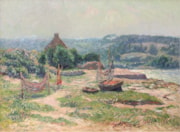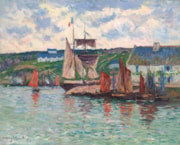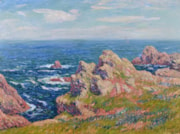back@using System.Web;



Henry Moret
(1856 - 1913)
Henry Moret was born in Cherbourg, 12th December 1856. Although he and his family were from Normandy it was Brittany that held a life-long fascination for the artist.
Moret received a traditional academic training with Jean Paul Laurens (1838-1921) at the Academy Julian and making his debut at the Salon in 1880. However, Moret rejected the academic style for that of his modern contemporaries, the Impressionists, particularly Claude Monet (1840-1926) and Paul Gauguin (1848-1903).
Moret was one of a number of young artists drawn to Pont Aven and Gauguin. Moret worked there and in the coastal villages and islands along the south coast of Brittany, painting in Douelan, Clohar and Belle Ile and on Graix and on the remote island of Ouessant on the western tip of Brittany. Moret sought out the local fisherman and farmers, painting the landscape and rocky coastline of this remote and desolate area. Moving from village-to-village Moret would often return to Pont Aven, in 1888 following Gauguin who was there with Claude Emil Schuffenecker (1851-1934) and Émile Bernard (1868-1941). Although Gauguin was a significant influence and friend it is the influence of Claude Monet that is prevalent in his marines and landscapes.
Moret infrequently travelled beyond the confines of Brittany, returning to Normandy and to Paris and visiting Holland.
Moret was widely collected, selling through the foremost Parisian dealer – Durand-Ruel – his works were sought after by collectors throughout Europe and in the United States and Great Britain.
His works can be found in museums in: Cardiff, Museums and Galleries of Wales; Southampton City Art Gallery; Paris, Musée d’Orsay; Quimper, Musée des Beaux-Arts; Reims; St. Petersburg, The Hermitage; Boston, Museum of Fine Arts; Indianapolis Museum of Art and Washington DC, National Gallery of Art.





